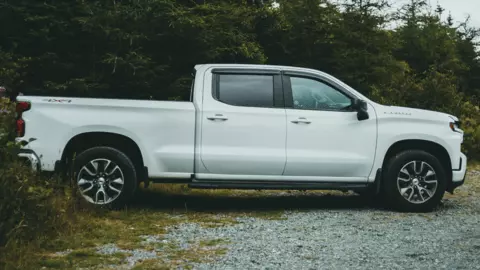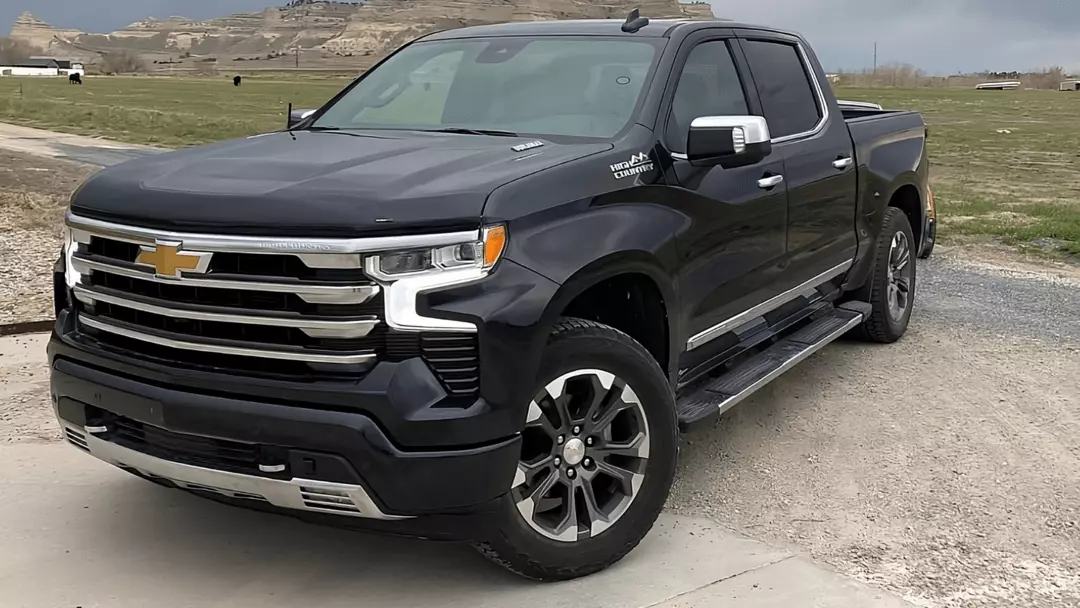For many, selecting a pickup truck goes beyond its appearance or horsepower. It hinges on a key metric: weight. If you’re someone who seeks both reliability and popularity in a truck, then the Chevy Silverado undoubtedly crosses your mind. But what’s the weighty truth behind this revered machine?
The 2023 models come with their own set of specifications:
- Chevrolet Silverado 3500: Tipping the scales at a starting weight of 6,947 pounds.
- Chevrolet Silverado 2500: Not far behind, it starts at 6,765 pounds.
- Chevrolet Silverado 1500: The lighter sibling begins at a modest 4,400 pounds.
However, it’s vital to note that these figures aren’t static. As you personalize your Silverado with additional features or gear it up for unique terrains, including Sewell’s varied landscapes, its weight can fluctuate.
Join us as we embark on a journey into the depths of the Chevy Silverado’s weight chart, dissecting variants and trims. Whether it’s the adaptable LT, the rugged charm of the LT Trail Boss, the epitome of luxury in the High Country, or the ever-dependable Work Truck (WT), we’ll shed light on what makes each Silverado tick, weight-wise.
Contents
- 1 Understanding Curb Weight
- 2 Weight of Chevy Silverado By Different Models
- 3 How Much Does a Chevy Silverado Weigh?-Detailed Explanation
- 4 Dimensions And Curb Weight Of The 2023 Chevrolet Silverado 1500
- 5 Weights Of 2021 Chevy Silverado By Model/Trim Level
- 6 Detailed Explanation:
- 6.1 Chevy Silverado LT:
- 6.2 Chevy Silverado LT Trail Boss:
- 6.3 Chevy Silverado LTZ:
- 6.4 Chevy Silverado WT:
- 6.5 Chevy Silverado High Country:
- 6.6 Chevy Silverado RST:
- 6.7 The Consequences of Overburdening a Chevy Silverado:
- 6.8 Compromised Driving Dynamics:
- 6.9 Accelerated Wear on Vital Parts:
- 6.10 Braking Issues:
- 6.11 Decreased Fuel Efficiency:
- 6.12 Damage To The Frame And Body:
- 6.13 Warranty And Insurance Concerns:
- 7 Determinants of Weight Fluctuations in a Chevy Silverado
- 8 Frequently Asked Questions
- 8.1 1. Does The Weight Of A Chevy Silverado Affect Its Performance?
- 8.2 2. Can The Weight Of A Chevy Silverado Be Increased?
- 8.3 3. How Does The Weight Of A Chevy Silverado Affect Its Fuel Efficiency?
- 8.4 4. What Are The Advantages Of A Lighter Chevy Silverado?
- 8.5 5. Why Is The Weight Of A Chevy Silverado Important?
- 9 Finally, Does The Weigh Of A Chevy Silverado Matter?
Understanding Curb Weight
Curb weight refers to the weight of a vehicle when it is empty and ready to drive, including all necessary fluids and a full tank of fuel, but without any passengers or cargo. It is an important specification that provides a baseline for understanding the weight of a vehicle. Curb weight affects various aspects of vehicle performance, such as acceleration, braking, and fuel efficiency.
Additionally, it determines the payload capacity and towing capabilities of the vehicle. Curb weight can vary based on trim level, engine size, drivetrain, and optional features. Understanding the curb weight of a Chevy Silverado is essential for making informed decisions regarding loading, towing, and overall vehicle usage.
Weight of Chevy Silverado By Different Models
| Model | Work Truck (lbs) | Custom (lbs) | LT (lbs) | RST (lbs) | LTZ (lbs) | High Country (lbs) | Custom Trail Boss (lbs) | LT Trail Boss (lbs) | ZR2 (lbs) |
| Silverado 1500 | 4,400 | 4,720 | 4,720 | 4,860 | 4,860 | 4,860 | 5,080 | 5,080 | 5,620 |
| Silverado 2500 | 6,105 | 6,450 | 6,418 | – | 6,765 | 6,852 | – | – | – |
| Silverado 3500 | 6,528 | – | 6,528 | – | 6,947 | 6,947 | – | – | – |
How Much Does a Chevy Silverado Weigh?-Detailed Explanation

When it comes to the Chevy Silverado, weight isn’t just a number on a scale. It’s an intricate dance of design, function, and trim variations. Let’s delve into the specifics of these iconic trucks.
Chevy Silverado 3500’s Heft
Trim variations in the Chevrolet Silverado 3500 lead to unique weight distinctions. For instance, both the Work Truck and LT models have a foundational curb weight of 6,528 pounds. On the other hand, the sophisticated LTZ and the elite High-Country trims have a grounding weight of 6,947 pounds.
Chevy Silverado 2500’s Scale
Dive into the 2500 series, and you’ll find a gradient of weights based on trim selection. The Work Truck trim stands firm at 6,105 pounds, the LT at 6,418, the Custom at 6,450, the LTZ at 6,765, and the High Country reigning in at 6,852 pounds.
Chevy Silverado 1500’s Balance
Within the 1500 series, there’s a vast spectrum. Starting with the Work Truck, which weighs in at 4,400 pounds, we climb to the Custom and LT trims, each resting at 4,720 pounds. The RST and LTZ trims carry a touch more heft at 4,860 pounds. The luxurious High-Country mirrors this weight. However, for those looking at the Custom Trail Boss and LT Trail Boss models, the scales tip at 5,080 pounds. Lastly, the robust ZR2 model stands distinctively at 5,620 pounds.
It’s evident that with every trim and variation, the Chevy Silverado offers a unique blend of weight, balancing function, luxury, and performance.
Dimensions And Curb Weight Of The 2023 Chevrolet Silverado 1500

The 2023 Chevrolet Silverado 1500 embodies both strength and grace, making it a standout light-duty pickup in its class. Its robust build promises longevity, while its thoughtful design ensures every drive is a pleasure.
Stretching anywhere from 211 to 242 inches, the Silverado 1500’s length varies based on your selected trim and engine configuration. Such a vast array of options empowers drivers, granting them the liberty to pick a model suited for smooth highways or challenging terrains. With a generous width of 81 inches, the Silverado ensures ample space, both inside and out.
However, it’s crucial to note that the 2023 Silverado 1500 isn’t one-size-fits-all in terms of weight. Depending on the specific model and additional features, your truck could weigh between 4,400 and 5,620 pounds. This flexibility in weight means Chevrolet caters to varied driving priorities, whether it’s fuel efficiency or formidable towing strength.
Weights Of 2021 Chevy Silverado By Model/Trim Level
| Model/Trim Level | Double Cab Standard Bed 4×2 (lbs) | Double Cab Standard Bed 4×4 (lbs) | Crew Cab Short Bed 4×2 (lbs) | Crew Cab Short Bed 4×4 (lbs) | Crew Cab Standard Bed 4×2 (lbs) | Crew Cab Standard Bed 4×4 (lbs) |
| Chevy Silverado LT | 4,693 | 4,940 | 4,702 | 4,915 | 4,772 | 4,965 |
| Chevy Silverado LT Trail Boss | – | 5,100 | – | 5,105 | – | 5,155 |
| Chevy Silverado LTZ | 4,693 | 4,940 | 4,702 | 4,915 | – | 4,965 |
| Chevy Silverado WT | 4,693 | 4,940 | 4,702 | 4,915 | 4,772 | 4,965 |
| Chevy Silverado High Country | – | – | 4,702 | 4,915 | 4,772 | 4,965 |
| Chevy Silverado RST | – | – | 4,702 | 4,915 | 4,965 | 4,772 |
Detailed Explanation:

Chevy Silverado LT:
Diverse in its offerings, the Chevrolet Silverado LT boasts an array of trims tailored to personal preferences. The Double Cab Standard Bed with a 4×2 drive weighs in at 4,693 pounds, whereas its 4×4 counterpart comes in at 4,940 pounds. The Crew Cab models, both Short Bed 4×2 and 4×4, balance out at 4,702 pounds. For those eyeing the Crew Cab Standard Bed, expect 4,772 pounds for the 4×2 and 4,965 pounds for the 4×4 variant.
Chevy Silverado LT Trail Boss:
Engineered for rugged terrains, the Silverado LT Trail Boss is a powerhouse. Both the Crew Cab Short Bed and Standard Bed 4x4s boast a hefty towing capacity of 5,155 pounds. Slightly lighter, the Double Cab Standard Bed 4×4 weighs 5,100 pounds.
Chevy Silverado LTZ:
Blending elegance with efficiency, the Silverado LTZ doesn’t disappoint. The Double Cab Standard Bed 4×2 stands at 4,693 pounds, while its 4×4 sibling measures 4,940 pounds. Both the Crew Cab Short Bed 4×2 and 4×4 level out at 4,702 pounds. Those opting for the Crew Cab Standard Bed 4×4 can anticipate a weight of 4,965 pounds.
Chevy Silverado WT:
True to its name, the Work Truck (WT) edition of the Silverado prioritizes durability and functionality. The Regular Cab Long Bed versions, 4×2 and 4×4, weigh 4,257 and 4,470 pounds respectively. Double Cab Standard Bed models, both 4×2 and 4×4, stand firm at 4,693 pounds. The Crew Cab Short Bed 4×2 registers at 4,702 pounds, and its 4×4 counterpart at 4,915 pounds. Those looking at the Crew Cab Standard Bed will find the 4×2 at 4,772 pounds and the 4×4 at 4,965 pounds.
Chevy Silverado High Country:
Exuding luxury, the Silverado High Country promises a lavish driving experience. Both the Crew Cab Short Bed 4×2 and 4×4 versions weigh an identical 4,915 pounds. For the Crew Cab Standard Bed, the 4×2 weighs 4,772 pounds, with the 4×4 version slightly heftier at 4,965 pounds.
Chevy Silverado RST:
The Chevrolet Silverado RST seamlessly combines power with practicality. With the Crew Cab Short Bed, you’ll find the 4×2 tipping the scales at 4,702 pounds, while the 4×4 variant weighs in at 4,915 pounds. In contrast, the Crew Cab Standard Bed 4×2 version holds its own at 4,965 pounds, whereas its 4×4 sibling is slightly lighter at 4,772 pounds.
The Consequences of Overburdening a Chevy Silverado:
When a Chevy Silverado is overloaded, it’s not just about carrying extra weight; it’s about the ripple effect of complications that arise. Here’s what can happen when you push your Silverado beyond its limits:
Compromised Driving Dynamics:
When you go beyond the stipulated payload limit, the vehicle’s balance and control take a hit. Navigating through turns, abrupt stops, or swift moves becomes increasingly challenging, upping the chances of mishaps. This not only endangers the occupants but also everyone else on the road.
Accelerated Wear on Vital Parts:
Carrying more than the permissible load puts undue strain on vital components, especially the suspension. This entails springs, shock absorbers, and other essential parts bearing the brunt of the excess weight. As a result, these components face faster wear and tear, translating to earlier replacements and added expenses.
Braking Issues:
An overloaded vehicle requires a longer distance to come to a complete stop. The additional weight increases the strain on the braking system, potentially leading to reduced braking efficiency, longer stopping distances, and increased risk of accidents.
Decreased Fuel Efficiency:
Carrying excessive weight places a greater demand on the engine, resulting in decreased fuel efficiency. Overloading can lead to more frequent trips to the gas station and increased fuel expenses.
Damage To The Frame And Body:
Continuous overloading can cause permanent damage to the vehicle’s frame and body structure. This damage may not be immediately apparent but can lead to structural integrity issues in the long term.
Warranty And Insurance Concerns:
Overloading a vehicle beyond its specified capacity may void the manufacturer’s warranty. Insurance claims related to accidents or damages caused by overloading may also be denied.
Important Tips: To ensure the safe operation and longevity of your Chevy Silverado, it is crucial to adhere to the recommended payload capacity and avoid overloading the vehicle. Always consult the owner’s manual or contact the manufacturer for specific weight limitations and guidelines for your particular model.
Determinants of Weight Fluctuations in a Chevy Silverado
Several elements can cause the weight of a Chevy Silverado to fluctuate. Here are the prominent reasons behind the weight differences among various Chevy Silverado models:
Engine and Drivetrain Variations:
The kind of engine selected plays a significant role in determining the vehicle’s weight. Naturally, bigger engines possess more mass than their compact counterparts. Furthermore, opting for a four-wheel-drive system (4×4) will increase the truck’s weight, given the extra machinery needed to provide power to each wheel.
Cab Size and Bed Length:

The cab size and bed length options available in the Silverado lineup can affect the truck’s overall weight. Generally, larger cab sizes and longer bed lengths result in heavier vehicles due to the extended dimensions and increased materials required for construction.
The Impact of Extras and Upgrades on Weight:
The Chevy Silverado’s heft can be influenced by optional amenities and enhancements. Incorporating cutting-edge multimedia systems, superior audio setups, running boards, plush leather seating, and expanded wheel dimensions can incrementally affect the vehicle’s weight. On top of that, supplementary elements like side steps, overhead storage solutions, and tow hitch kits can also add to the overall poundage.
Impact of Trim Variations and Material Utilization:
Evolving Trim Specifications
Each Chevy Silverado trim caters to a unique set of preferences. While base trims are designed to be more utilitarian, higher-end trims are embellished with features that, while luxurious, can influence the vehicle’s heft. Such features might include enhanced seating with additional adjustments, advanced sound systems, or more extensive infotainment displays. As one ascends the trim ladder, it’s not uncommon to find the truck gaining weight due to these added niceties.
Material Decisions
The choice of construction materials plays a crucial role in the weight equation. Innovations in car manufacturing have introduced materials like aluminum, which offers durability without the weight penalty of traditional materials. Similarly, the use of high-strength steel in critical areas ensures safety and durability without unnecessary weight. Yet, the selection and proportion of these materials can differ based on trim options and production years, leading to varied weights even within the same model range.
Frequently Asked Questions
1. Does The Weight Of A Chevy Silverado Affect Its Performance?
Yes, the weight of a Chevy Silverado can significantly impact its performance. A lighter truck may offer better fuel efficiency and acceleration, while a heavier truck may excel in towing and hauling capabilities. It’s essential to consider your specific needs and priorities when choosing the weight configuration that suits your requirements.
2. Can The Weight Of A Chevy Silverado Be Increased?
Yes, the weight of a Chevy Silverado can be increased by adding features, options, and customizations. For example, additional accessories like towing packages, bed liners, or off-road enhancements can increase curb weight. It’s crucial to be mindful of the weight capacity and ensure that any modifications align with the truck’s specifications.
3. How Does The Weight Of A Chevy Silverado Affect Its Fuel Efficiency?
Generally, a heavier Chevy Silverado may have slightly lower fuel efficiency than a lighter model. The increased weight requires more energy to move the vehicle, resulting in higher fuel consumption. However, engine technology and aerodynamic advancements have helped mitigate this impact, and modern Silverado models still offer respectable fuel efficiency.
4. What Are The Advantages Of A Lighter Chevy Silverado?
A lighter Chevy Silverado can improve acceleration, manoeuvrability, and potential fuel savings. Lighter trucks may also be more agile off-road and have a more comfortable ride quality. If your primary usage involves city driving or you prioritize efficiency over maximum towing capacity, a lighter Silverado may be suitable.
5. Why Is The Weight Of A Chevy Silverado Important?
Understanding the weight of a Chevy Silverado is crucial for several reasons. It helps determine the truck’s towing and payload capabilities, fuel efficiency, handling characteristics, and overall performance. Additionally, being aware of the weight ensures that you can safely operate the vehicle within its specified limits and avoid exceeding its capacity, which could lead to mechanical issues or safety concerns.
Finally, Does The Weigh Of A Chevy Silverado Matter?
Yes, the weight of a Chevy Silverado does indeed matter. It is vital in determining the truck’s performance, fuel efficiency, towing capacity, and overall functionality. Whether you prioritize acceleration, off-road capability, or heavy-duty hauling, understanding the weight of your Silverado is essential for making an informed decision.
The weight affects various aspects of the truck’s dynamics, including agility, stability, and braking distances. It also determines how much weight the truck can safely tow or carry in its bed. Exceeding the weight limits can strain the engine, suspension, and braking system, compromising safety and potentially causing damage.
Resource Link:
- https://www.silveradosierra.com/
- https://chevroletforum.com/forum/silverado-fullsize-pick-ups-21/
- https://www.chevyzr2.com/
- https://chevyforum.org/chevy-forums/forums/chevy-silverado-forum.12/
- https://www.chevrolet.com/trucks/silverado/1500
- https://www.chevrolet.com/trucks/silverado/2500hd-3500hd
- https://www.chevrolet.com/trucks/silverado/3500hd/build-and-price

Hello, this is Wesley Shelton, currently working in a car restoration company for over 5 years. Before that, I was a worker at a small car repair shop. As I was a car freak from a young age and worked as a professional for over half a decade, I think I now know pretty much everything about every car and its parts. To establish my name as a professional and help others by sharing my knowledge, I’ve created this website, which I work on whenever I get free time. I hope you’ve enjoyed my informative blog!


